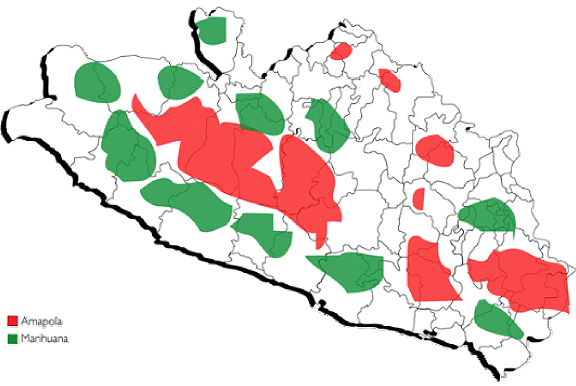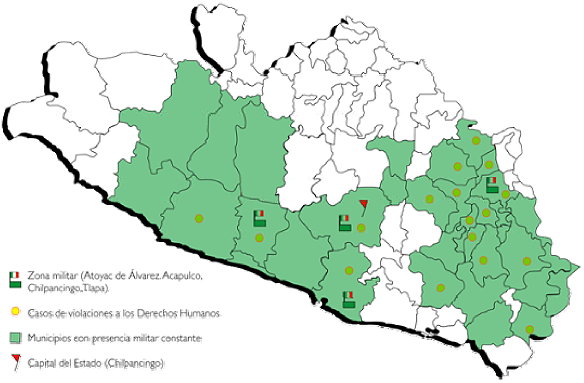MIGRATION
06/02/2012
DRUG TRAFFICKING
06/02/2012In Guerrero, the presence of the Armed Forces in public life and particularly in the field of security was a constant during the twentieth century. In the twenty-first century, the trend has not changed. At present, militarization is justified as a component of the security policy that the federal government has promoted in the framework of so-called “war on drugs”. However, in Guerrero, one of the underlying explanation of military presence continues to be social control, as it has been a historical constant in the state.
Source: Report XVI Struggling to build the dawn of justice, Human Rights Centre Tlachinollan, 2011.
On 6 October 2011, the federal government and Guerrero state-government announced the launching of the Coordinated Operation “Secure Guerrero,” in an intention to respond to the grave security crisis lived in the state. In accordance with the little information to date made public, the new joint operation implies the deployment of 2000 soldiers in the state, including one thousand from the Army, 300 from the Navy, 650 from the Federal Police, and 50 from the Federal Attorney General’s Office (PGR), in addition to the thousand state police and 500 others who will be incorporate into service in November.
In a communiqué published on 12 October 2011, civil-society organizations, including the Tlachinollan Mountain Center for Human Rights and the Guerrero Network of Civil Organizations for Human Rights, affirmed that the “the annunciation of the new ‘Secure Guerrero’ Operation is nothing new; on the contrary, it seeks to repeat a strategy that has shown itself to be inefficient in reducing levels of violence; it moreover would increase the risks that there occur new human-rights violations. Similar programs have been seen to be problematic in Guerrero itself [2007], as in other states like Chihuahua.”
They denounced as well that “the annunciation of a new joint operation makes clear that the federal government and state government revert to actions that have shown themselves to be inefficacious in that they do not seek to respond to the problems at root nor even succeed in reducing levels of violence but rather generate conditions in which the people’s human rights are violated, renouncing approaches that would design and institute wholesome policies that have to do with the logic of citizens’ security: that is to say, ones that make central the guarantee of the rights of all persons above the protection of institutions and to the margin of prevailing warlike conceptions. In this sense this orientation persists, as in the recently announced operation, which will only increase our alarm for the predictable increase in violence and the anticipated increase in rights-violations.”

